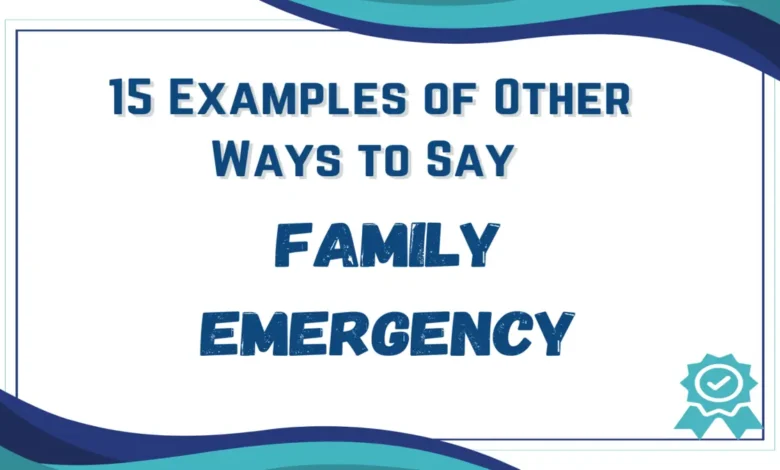Another Word for Family Emergency: 1Exploring Different Terms and Their Meanings

Another Word for Family Emergency are situations that require immediate attention due to the urgent needs of a family member. They can be overwhelming, leaving individuals with little time to think clearly or act decisively. When faced with such emergencies, people often need to communicate with others, whether it’s in a professional context or when informing loved ones. Having alternative ways to describe a family emergency can be helpful in these situations.
In this article, we will explore several terms and phrases that can be used instead of “family emergency,” offering insights into their nuances and appropriateness in various scenarios. Understanding the variety of expressions available to describe these stressful events can help you communicate more effectively, whether in writing or conversation. Let’s dive into some of the most common synonyms and their significance.
Understanding Family Emergencies
Before we dive into alternative expressions, it’s essential to understand what constitutes a family emergency. Typically, a family emergency refers to an unexpected event involving a family member that requires immediate attention. This could involve medical issues, accidents, legal matters, or any urgent situation that demands personal involvement.
A family emergency is often unexpected, causing disruption to regular schedules and plans. It can evoke strong emotions such as fear, anxiety, and stress, as the individual involved needs immediate support or assistance. In these critical moments, time is of the essence, and individuals might need to take quick action to address the situation at hand.
Crisis Involving a Family Member
One alternative phrase commonly used to describe a Another Word for Family Emergency is “crisis involving a family member.” This term conveys the urgency and gravity of the situation while keeping the focus on the family relationship. It can be used when the situation is dire, and there is a need for immediate attention, whether it’s medical, emotional, or logistical.
The term “crisis” implies that the situation is beyond the ordinary, indicating that it’s something requiring swift action or intervention. For instance, if a family member has been involved in a car accident, you might say, “I’m dealing with a crisis involving a family member,” which conveys the seriousness of the matter without getting into specific details.
Additionally, using the word “crisis” adds a layer of emotional weight to the situation, indicating that it’s more than just a minor issue. It can also imply that the situation may have life-altering consequences, which often prompts a greater sense of urgency in those being informed.

Personal Family Matter
Another term to use when referring to a family emergency is “personal family matter.” This phrase is slightly less dramatic than the word “crisis” but still emphasizes the personal and private nature of the situation. It’s a polite way to communicate that something urgent has arisen within the family that requires attention, without going into too much detail.
When you mention a “personal family matter,” you are signaling that the situation is private and not for public discussion. This can be particularly useful in professional settings, as it helps maintain the boundary between personal and work life. It allows the individual to attend to their needs without being questioned about the specifics.
For example, if you need to take time off from work due to a family emergency, you might say, “I need to attend to a personal family matter,” which conveys the seriousness of the situation while preserving your privacy.
Family Crisis
“Family crisis” is another term that can be used to describe a family emergency. It shares similarities with the word “crisis involving a family member,” but this term broadens the scope. A family crisis could include any situation that disrupts the family dynamic and requires urgent action. This could include everything from financial hardship to legal issues or major health problems.
A family crisis can have long-lasting implications for those involved, especially if it affects multiple family members or strains relationships. Using the term “family crisis” acknowledges the gravity of the situation and highlights that it is not just a minor issue but rather a significant event that affects the family unit as a whole.
It’s important to recognize that while the term “family crisis” conveys urgency, it can also suggest that the situation has deeper, underlying issues that need to be addressed over time. This makes it an appropriate term for more complex emergencies that may take longer to resolve.
Emergency Family Situation
“Emergency family situation” is another common expression that can be used interchangeably with “family emergency.” This term emphasizes the urgency of the situation while focusing on the fact that it involves a family member. It’s a versatile phrase that can be used in a wide variety of contexts, including work, school, or personal conversations.
An “emergency family situation” might involve an illness, accident, or any other unforeseen circumstance that demands immediate attention. The word “situation” is general enough to encompass a broad range of events while still implying that they are urgent and require action.
This term also offers some flexibility in communication, as it doesn’t delve into the specifics of the emergency. It allows the speaker to convey the need for immediate attention without disclosing too much personal information. For instance, if someone is dealing with an urgent situation at home, they might say, “I have an emergency family situation and need to step away,” indicating that the matter requires their attention but maintaining some level of privacy.
Unexpected Family Incident
An “unexpected family incident” is another way to describe a family emergency. This term works well when the situation is sudden and unforeseen, creating a sense of urgency. It’s a neutral phrase that can be used in various contexts without sounding overly dramatic or alarming. The word “incident” implies that something unexpected has occurred, and it requires immediate attention or action.
For example, if a family member falls ill suddenly or experiences a medical emergency, you might say, “I’m dealing with an unexpected family incident.” This conveys that something unexpected has happened within the family, and it requires your immediate attention, without overloading others with too much information.
The use of the word “incident” helps maintain a sense of neutrality, making it suitable for both casual and professional conversations. It allows the speaker to communicate the need for immediate attention without revealing too much about the specifics of the event.
Urgent Family Matter
An “urgent family matter” is another common synonym for a family emergency. This phrase emphasizes the immediate need for attention, suggesting that the situation is pressing and cannot be ignored. The word “urgent” denotes the seriousness of the situation, and when paired with “family matter,” it conveys that the emergency involves a family member and requires quick action.
For example, if someone needs to leave work or take time off due to a family emergency, they might say, “I’m dealing with an urgent family matter.” This makes it clear that the situation is time-sensitive and requires their immediate attention. It also suggests that the matter is personal, implying that it’s something they need to handle in their personal capacity.
The term “urgent” helps convey the seriousness of the event without sounding overly dramatic. It’s often used when the emergency cannot be postponed and needs to be addressed right away.
Family Health Crisis
Another specific term that can be used to describe a family emergency is a “family health crisis.” This phrase is more focused, indicating that the emergency revolves around a health issue involving a family member. Whether it’s a serious illness, injury, or medical emergency, a “family health crisis” makes it clear that the situation requires immediate attention due to its impact on a loved one’s well-being.
A family health crisis can be a particularly stressful type of emergency, as it often involves emotions like fear, concern, and anxiety. The term communicates the urgency of the situation, highlighting that the health of a family member is at stake.
For example, if a family member is hospitalized after a severe accident, you might say, “I’m dealing with a family health crisis.” This term conveys the gravity of the situation and helps others understand why you may need to take immediate action.
Private Family Emergency
A “private family emergency” is another useful expression that implies the family emergency requires immediate attention but also emphasizes that the situation is personal and private. The word “private” signals that you may not want to share the full details of the emergency, while still communicating that it is an urgent situation involving a family member.
In both personal and professional contexts, using the term “private family emergency” can be a polite way to request time off or to excuse yourself from a meeting or event without divulging too much information. For example, if you need to leave work suddenly due to an emergency at home, you might say, “I have a private family emergency that requires my attention,” indicating that you need to take care of the matter but are not ready to provide specifics.
This term helps maintain your privacy while still conveying the urgency of the situation. It shows that the matter is serious and demands your immediate attention, but it allows you to avoid discussing personal details publicly.
Conclusion
In conclusion, there are many ways to describe a family emergency, each with its subtle nuances. Whether you choose to use terms like “family crisis,” “urgent family matter,” or “private family emergency,” these expressions allow you to communicate the urgency and importance of the situation without necessarily diving into personal details.
Understanding these alternative phrases can help you navigate delicate situations with more flexibility and sensitivity, allowing you to communicate the necessity of addressing a family emergency while maintaining privacy. The key is to choose the expression that best suits your situation, the audience you are addressing, and the level of detail you are comfortable sharing.
Remember, in times of family emergencies, the most important thing is to respond quickly and compassionately to the needs of your loved ones. The language you use to describe the situation can help convey its significance and urgency, ensuring that others understand the gravity of the moment.






